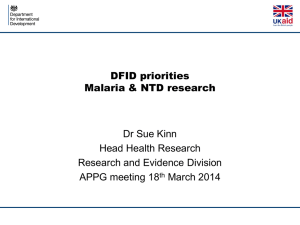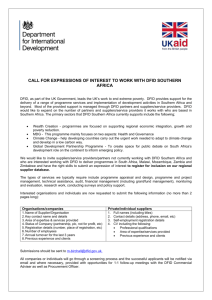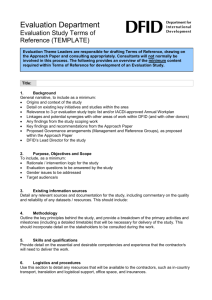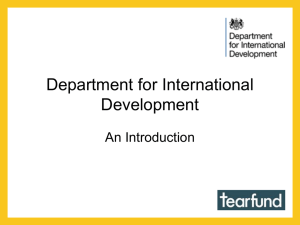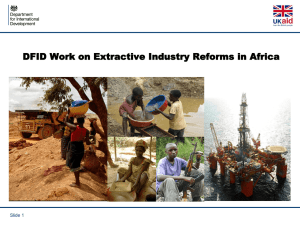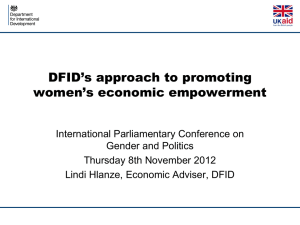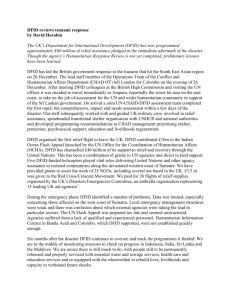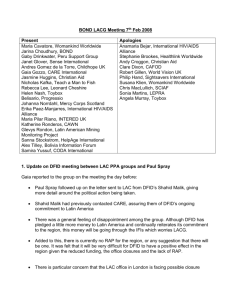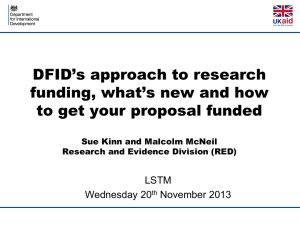MEETING WITH BOND 27th APRIL 2007
advertisement
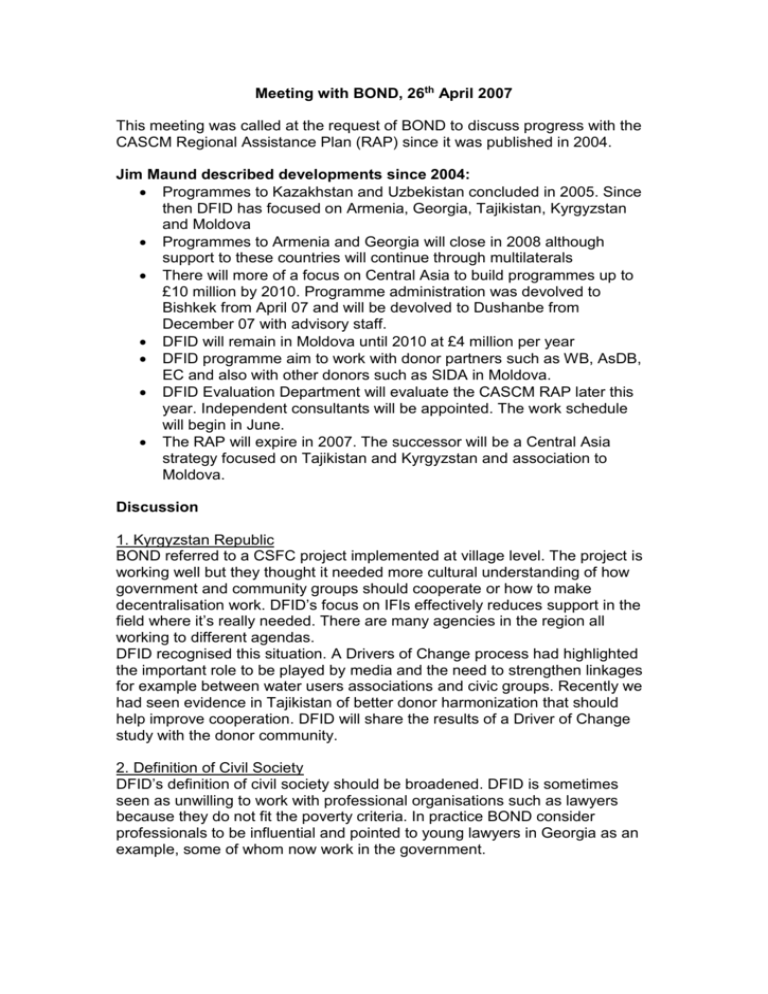
Meeting with BOND, 26th April 2007 This meeting was called at the request of BOND to discuss progress with the CASCM Regional Assistance Plan (RAP) since it was published in 2004. Jim Maund described developments since 2004: Programmes to Kazakhstan and Uzbekistan concluded in 2005. Since then DFID has focused on Armenia, Georgia, Tajikistan, Kyrgyzstan and Moldova Programmes to Armenia and Georgia will close in 2008 although support to these countries will continue through multilaterals There will more of a focus on Central Asia to build programmes up to £10 million by 2010. Programme administration was devolved to Bishkek from April 07 and will be devolved to Dushanbe from December 07 with advisory staff. DFID will remain in Moldova until 2010 at £4 million per year DFID programme aim to work with donor partners such as WB, AsDB, EC and also with other donors such as SIDA in Moldova. DFID Evaluation Department will evaluate the CASCM RAP later this year. Independent consultants will be appointed. The work schedule will begin in June. The RAP will expire in 2007. The successor will be a Central Asia strategy focused on Tajikistan and Kyrgyzstan and association to Moldova. Discussion 1. Kyrgyzstan Republic BOND referred to a CSFC project implemented at village level. The project is working well but they thought it needed more cultural understanding of how government and community groups should cooperate or how to make decentralisation work. DFID’s focus on IFIs effectively reduces support in the field where it’s really needed. There are many agencies in the region all working to different agendas. DFID recognised this situation. A Drivers of Change process had highlighted the important role to be played by media and the need to strengthen linkages for example between water users associations and civic groups. Recently we had seen evidence in Tajikistan of better donor harmonization that should help improve cooperation. DFID will share the results of a Driver of Change study with the donor community. 2. Definition of Civil Society DFID’s definition of civil society should be broadened. DFID is sometimes seen as unwilling to work with professional organisations such as lawyers because they do not fit the poverty criteria. In practice BOND consider professionals to be influential and pointed to young lawyers in Georgia as an example, some of whom now work in the government. 3. Corruption With corruption prevalent in the region and civil society weak, BOND asked why DFID provides budget support. DFID recognised the importance of corruption as a governance issue and pointed to work to improve public financial management to improve the budget process and encourage accountability. The RAP commits CASCM to providing budget support. Fiduciary Risk ensures DFID funds are not provided directly to government structures. There is a Kyrgyzstan SWAP but money is not under direct control of the Government because of inadequate systems. DFID usually channel funds through Trust Funds. We are channelling £2m directly into regional development work in 2 regions of in Armenia. This has the full support of GoA. The results of 2 recent audits, which looked into the management of these funds, have been encouraging. Public Financial Management arrangements in Georgia have included support to civil society to ensure accountability. 4. Armenia BOND asked why DFID was closing in Armenia in 2008. DFID replied that Armenia and Georgia have reached LMIC status. With limited resources DFID must necessarily focus on the poorest. There is good economic growth in both countries and significant funding coming from other channels such as the MCA. Armenia will also receive support through the EC including provision for Budget Support and Twinning. DFID is working up strategies on how to work with the Commission. DFID will work to ensure the sustainability of our work in these countries and encourage linkages with the EC to take on lessons learned through ARDEP. We are also working with Civil Society through the Eurasia foundation and through Crisis Management Initiative to help improve understanding of EC processes. 5. Moldova BOND noted that DFID will close in Moldova. DFID recognised that Moldova is the only LIC in Europe and will remained engaged until 2010 with a programme of £4 million. Its economy is growing and it has crossed the MIC threshold. Given the pressure on resources DFID has had to justify maintaining support to a small country. Continuing in Moldova to 2010 is a good outcome. 6. Consultation with EC BOND concerned that the EC does not properly consult about operations in Central Asia. Initially the EC delegation in Almaty was keen on discussion with civil society about the draft NIP. Sadly there has been no subsequent discussion or information provided. What could NGOs do? DFID replied that it was under strong direction to influence the EC. DFID has an SNE secondment in Relex who suggests influencing the EC is best done locally. DFID is preparing a country by country strategy on how we can influence the EC and will draw in civil society to our discussions. In Tajikistan the EU is actively involved in the donor process. In Central Asia, Arthur van Diesen (Civic Engagement and Accountability Adviser) hosted a meeting with NGOs which will be the first of a series. 7. Labour Migration BOND asked whether DFID is dealing with Labour Migration issues. DFID confirmed that it was and that an ECAD adviser is working specifically on the impact of remittances. DFID has discussed with IOM the potential of investment from remittances in Tajikistan under EBRD’s Early Transition Countries initiative. Within ECAD an internal article exists that informs our approach that we will try to release to BOND. 8. Emigration BOND commented that emigration has a big impact on women and livelihood issues. DFID referred to its TPAC (Third Party Arbitration Centre) project in Tajikistan that women have used to help resolve land disputes. This issue is very important in Tajikistan and has the attention of the President ahead of the Consultative Group. 9. Credits for Farmers BOND asked about alternative sources of credits for farmers. DFID replied that the ECAD economist was in Central Asia week beginning 30th April as part of a multi-donor mission to various issues related to banking reform to benefit lower income people. DFID has worked with EBRD on the Tajikistan Micro and Small Enterprises Finance Facility (TMSFF) that appears successful. A review of the ETC will take place later this year that could include an assessment of TMSFF. 10. Regulation BOND commented that the adoption of SME regulations in Tajikistan is counterproductive. For example it can need 194 signatures to open a restaurant. Once regulation exists corruption issues are exposed. DFID recognise that this is difficult cycle to break. The unified donor approach should enable pressure to be applied to take forward reform. 11. UK Parliament Is DFID engaged with UK Parliament? BOND believe MPs are engaged in the region but tend to focus on human rights issues. A DFID input might help broaden the parliamentary perspective. DFID replied that it is a requirement to report on our communication with Parliament but in practice we have not done this very actively. We should step up our communication with Parliament to better highlight our success. Conclusion Jim Maund concluded that this meeting need not be a one-off event. Following this meeting DFID would: Prepare a note of the meeting including names and e-mail addresses Forward the note about Migration Feedback on the Evaluation Process Take note of civil society concerns during our work on ENP Inform BOND of the successor to the RAP and the proposed consultation process. DFID will discuss the Evaluation with EvD week beginning 30th April. BOND’s concerns will be included. The EvD team will visit 3 of the 5 countries and we will inform BOND which countries have been selected. Participants DFID (Phone 020 7023 followed by the extensions below) Jim Maund, Team Leader, j-maund@dfid.gov.uk, x0463 Melissa Harrold, Deputy m-harrold@dfid.gov.uk, x0770 Magdalena Banasiak, Infrastructure and Environment Adviser m-banasiak@dfid.gov.uk, x1203 John Carpenter, Deputy Programme Manager, Central Asia, j-carpenter@dfid.gov.uk , x1834 Felicity Malcolm, Programme Officer for Central Asia, f-malcolm@dfid.gov.uk, x1037 Brian Penny, Moldova Programme Manager, b-penny@dfid.gov.uk x1031 By video link Evaluation Department Iain Murray, Programme Manager, i-murray@dfid.gov.uk, x3605 Karen Kiernan, Deputy Programme Manager, k-kiernan@dfid.gov.uk, x3382 BOND EveryChild, Joanna Baskott (Jo.baskott@everychild.org.uk) Mercy Corps Scotland, Mark Chadwick (mchadwick@uk.mercycorps.org) Allavida, Jonathan Edwards (jonathane@allavida.org) Age Concern England, Oscar Franklin (oscar.franklin@ACE.org.uk Christian Aid, Ben Hobbs (bhobbs@christian-aid.org World Vision UK, Angela Kellett (angela.kellett@worldvisin.org.uk) EveryChild, Chris Rayment (crayment@everychild.org.uk) OXFAM, Rita Saravia White (rswhite@oxfam.org.uk) International Alert, Juliet Schofield (jschofield@international-alert.org) Sue Ryder Care, Ben Simms (ben.simms@suerydercare.org) HelpAge International, Lewis Temple (ltemple@helpage.org) Consumers International, Rosa Vercoe. (rvercoe@consint.org)
